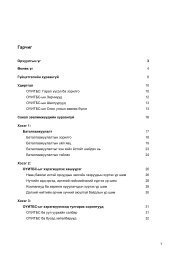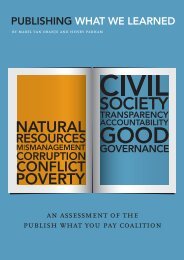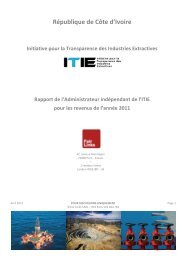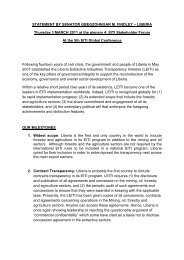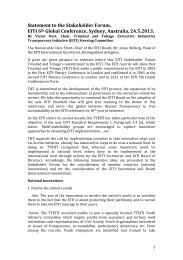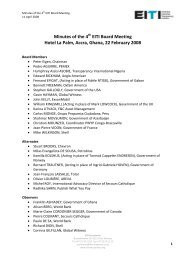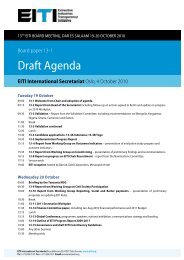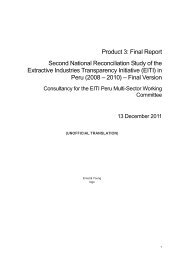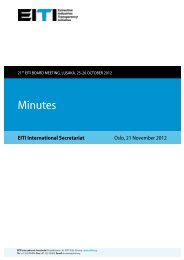Vietnam feasibility study - EITI
Vietnam feasibility study - EITI
Vietnam feasibility study - EITI
You also want an ePaper? Increase the reach of your titles
YUMPU automatically turns print PDFs into web optimized ePapers that Google loves.
46<br />
Smith (2004) claims that transparency is a quality of expression based on clarity and publicity. It<br />
allows interested people to have a clear look and be able to monitor and evaluate easily.<br />
According to the UNPAN (1999), Campo & Sundaram (2000), in term of government’s management,<br />
transparency is understood as the ability to access information and the favorable conditions for<br />
people to understand the process of decision – making. For example, people are able to freely access<br />
information and monitor government debates on television, audit reports of the government, and<br />
public recruitment for public officials.<br />
In the financial sector, transparency in monetary policy according to IMF refers to an environment in<br />
which the objectives of policy; its legal institutional system and economic framework; policy decisions<br />
and their rationale; data and information related to monetary and financial policies; and the terms of<br />
agencies’ accountability are publicized on an understandable, accessible, and timely basis. Geraats<br />
(2001) claims that transparency is a general definition related to policy, economic, culture, process<br />
or procedure, policy-making and policy implementation. According to VCCI (2009), transparency in<br />
<strong>Vietnam</strong>’s Provincial Competitiveness Index (PCI) is understood as: “the enterprise’s capacity to access<br />
provincial plans and necessary legal documents for business; the availability of these documents; whether<br />
or not they are consulted by enterprises before enforcing them; the predictability in the implementation<br />
process of those documents and the convenience of a province’s website for business”.<br />
Transparency associates closely with the concept of accountability. The purpose of transparency is<br />
to allow the economy’s subjects (people, business, and government) easily to explain their policies<br />
and activities. Transparency is also considered as evaluation tool for public agencies which provide<br />
necessary information for agents’ activities of the economy. Also, based on that, the public can easily<br />
inspect the information provided and use it to maintain the accountability of organizations. In this<br />
sense, transparency could be an interaction between people inside and outside an organization,<br />
which people outside an organization (such as people or shareholders) can monitor, supervise<br />
and evaluate activities of people inside an organization (such as government officials or company<br />
managers).<br />
Iv.2 - TransParencY reGulaTIOns In vIeTnam<br />
Iv.2.1 Transparency in current legal regulations<br />
Right to be informed is one of the fundamental rights of <strong>Vietnam</strong>ese citizens by the national<br />
Constitution. The 1992 Constitution, article 69 affirms that “Citizens are entitled to freedom of speech<br />
and freedom of the press; they have the right to receive information and the right of assembly, association<br />
and demonstration in accordance with the law”.<br />
In <strong>Vietnam</strong>’s legal system, the Law on Anticorruption No 55/2005/QH11 of 2005 also provides many<br />
rules and regulations relating to public liability and transparency. Article 11 regulates principles<br />
on and content of publicity and transparency in the activities of agencies, organizations and units.<br />
Paragraph 2 reads “Agencies, organizations and units must publicize their activities, except for contents<br />
classified as state secrets and other contents prescribed by the Government.” Article 15 says about<br />
financial and state publicity and transparency that:<br />
“1. Budgets of all levels and budget-estimating units must publicize in detail the estimate and settlement<br />
figures, which have been decided and ratified by competent state bodies, including supplemented budget<br />
amounts.<br />
2. Budget-estimating units with revenue sources from and expenditures covered by constructions of<br />
organizations and/or individuals according to the provisions of law must publicize the mobilization<br />
The Extractive Industries Transparency Initiative and the Implementation Perspective of <strong>Vietnam</strong>



